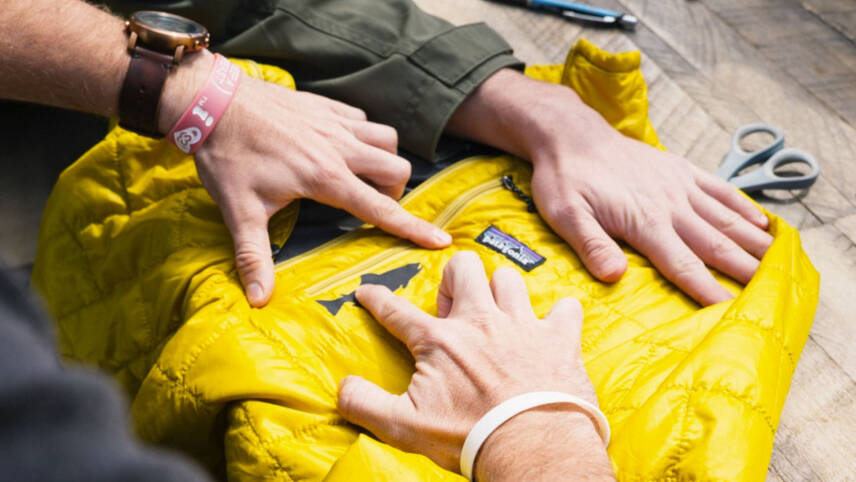Register for free and continue reading
Join our growing army of changemakers and get unlimited access to our premium content

Image: Patagonia
Patagonia announced today (13 July) that it is launching a new online portal to help more of its customers in Europe access repair services. It is also calling on other brands to follow suit.
The ‘Worn and Wear’ repair portal will enable customers to file a repair request 24/7 and to track the status of their request. Goods that can be repaired will be sent directly from customers to either a store or Patagonia’s network of third-party ‘fixers’.
To facilitate the launch of the portal, Patagonia is hiring more ‘fixers’ both directly and indirectly. It is aiming to grow its European base of repair staff from 25,000 at present to 100,000 in the next four years.
Patagonia is notably a co-founder of the Amsterdam-based United Repair Centre, which trains and guarantees work to experienced clothing makers and repairers. It has a particular focus on those facing challenges finding employment locally.
“At Patagonia, we know that offering free repairs brings us many benefits, and a unique moment to engage with our customers – and to scale our impact, we are looking for companies to join us in the repair movement,” said Patagonia’s director of finance and operations for the EMEA region, Willem Swager.
The Ellen MacArthur Foundation estimates that a bin lorry full of used clothing is landfilled or burned every second. Less than 2% of the clothes, shoes and accessories produced every year are recycled into new fashion; most that are recycled are ‘downcycled’ into products such as cushion stuffing and insulation.
Reuse, resell, rent, repair
It is good news, then, that COS, Visa and the United Repair Centre have this week launched a new collaborative project assessing consumer behaviours around fashion.
The organisation will assess what is stopping shoppers from accessing resale, rental and repair, before developing potential solutions that will be shared openly.
It will also look more deeply into the gap between intention and action; why is it that so many people say they would pay more for sustainable goods, or for recommerce, but then opt for the unsustainable choice?
Visa Europe’s VP for sustainability and inclusive impact, Katherine Brown, said: “Over half of Europeans are already regularly engaging in recommerce activities like resale. By uncovering what actually gets shoppers to change their behaviour and by leveraging our data and insights from these experiments with United Repair Centre and COS, we can identify new ways to make sustainable fashion a must-have purchase and accelerate the transition to the circular economy for all.”
Early research will be conducted in the UK, France, the Netherlands and Germany. COS will pilot some of the recommended solutions to assess their practicality. Also partnering on this initiative are fintech firm Twig, behavioural intervention specialists Mindworks and the Ellen MacArthur Foundation.
Supply chain focus
In other fashion news, Inditex, which owns brands including Zara, has this week pledged to halve supply chain emissions by 2030.
Eliminating the use of coal-fired heat and electricity at manufacturers will be a key focus. No Inditex suppliers will be permitted to use coal past the 2030 mark. As a first step, the company will cease certifying any new suppliers or manufacturers using coal by the end of 2023. Suppliers will also be supported to source materials with a lower environmental footprint.
These moves form part of a wider transformation programme for the supply chain. Inditex is one of the world’s biggest fashion retailers in terms of financials, and is also a significant contributor to volumes of fast fashion, releasing around 20,000 different styles each year.
Stand.earth and Fashion Revolution research has repeatedly confirmed that most large fashion brands do not disclose emissions from their supply chains.
While Inditex’s commitment will improve transparency here, and hopefully assist in the broader shift away from coal, Stand.earth wants more to be done to ensure that suppliers can transition to renewables rather than gas or biomass.


Please login or Register to leave a comment.